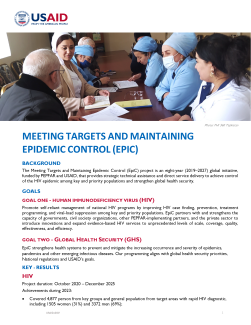2021 - 2023 | BRANCH OF FAMILY HEALTH INTERNATIONAL (FHI 360) | $1,128,000
BACKGROUND
The Meeting Targets and Maintaining Epidemic Control (EpiC) project is an eight-year (2019–2027) global initiative, funded by PEPFAR and USAID, that provides strategic technical assistance and direct service delivery to achieve control of the HIV epidemic among key and priority populations and strengthen global health security.
GOALS
Goal One - Human Immunodeficiency Virus (HIV)
Promote self-reliant management of national HIV programs by improving HIV case finding, prevention, treatment programming, and viral-load suppression among key and priority populations. EpiC partners with and strengthens the capacity of governments, civil society organizations, other PEPFAR-implementing partners, and the private sector to introduce innovations and expand evidence-based HIV services to unprecedented levels of scale, coverage, quality, effectiveness, and efficiency.
Goal Two - COVID-19 Response
EpiC strengthens health systems to prevent and mitigate the increasing occurrence and severity of epidemics, pandemics and other emerging infectious diseases. Our programming aligns with global health security priorities, National regulations and USAID’s goals.
KEY - RESULTS
HIV
Project duration: October 2020 – December 2025
Achievements during 2023:
- Covered 4,877 person from key groups and general population from target areas with rapid HIV diagnostic, including 1505 women (31%) and 3372 men (69%);
- Contributed to 37% of all new HIV cases found in PEPFAR sites (273 out of 732);
- Contributed to 49% of all newly identified people living with HIV (PLHIV) who initiated antiretroviral therapy in PEPFAR sites (310 out of 627);
- Provided case management services to 381 PLHIV to support treatment adherence which resulted in viral load suppression;
- The first Community Health Center in Central Asia was launched in Khujand in 2022, offering accessible medical services to the local community, with around 120 visitors in a month.
- Contributed to CBO ‘Marvorid’ receiving state funding as part of the state social contracting for 2023 (in addition to CBO ‘SPIN Plus’);
- Led efforts to reduce stigma and improve the quality of life for PLHIV through activities and high-level Forum that opened a dialogue between the state partners, CBOs, PLHIV and civil society to advocate for equality and eliminate HIV-related discrimination.
PROJECT BUDGET FOR 2024: $1,667,196
GHS
Project duration: September 2023 – September 2024
Infection Prevention and Control (IPC)
- Collaborate with the Ministry of Health and Social Protection of Population of Tajikistan to develop hospital specific implementation plans for the new national IPC guideline for 50 selected healthcare facilities (HCF) of 25 districts;
- Conduct IPC assessments in 50 HCF of 25 districts to assess the current IPC situation, that is, existing IPC activities/resources, and identify strengths and gaps;
- Conduct capacity strengthening activities on IPC for 300 healthcare workers (HCW);
- Develop mentorship program on IPC and conduct mentorships to the HCW of the selected HCF;
- Ensure that selected HCFs have IPC information, education, and communication materials aligned to the WHO requirements;
- Contribute to a culture of safety by developing and disseminating a short film on IPC;
- Establish a Training center for Strengthening Epidemiological Expertise and Infectious Disease Response equipped with IT equipment, medical equipment for practical sessions, and study materials.
Health Emergency Management
- Conduct training of trainers for 120 epidemiologists, laboratory doctors and infectious disease specialists from DRS, Khatlon, Sughd, and GBAO on demanded emergency preparedness and response topics;
- Assess the preparedness of medical facilities for responding to infectious disease emergencies;
- Create, revise, and maintain legal documents for emergency preparedness and response to infectious disease outbreaks;
- Provide technical assistance to the Center for Public Health Emergency Response for monitoring affected areas during infectious disease outbreaks.
PROJECT BUDGET FOR 2024: $1,200,000
IMPLEMENTING AGENCY: BRANCH OF FAMILY HEALTH INTERNATIONAL (FHI 360)


